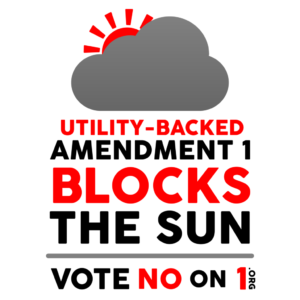
You’ve already heard that the presidential campaigns consider Florida to be one of a handful of swing states that they must win for a chance at the White House.
But you may not know that the state has also become a battleground over the future of solar power.
The fate of a measure on the state’s ballot this November will help decide whether solar will spread quickly or face more obstacles in the Sunshine State.
More interesting for us, the Florida election results could also have the same effect in Virginia.
Clouds Over the Sunshine State
Based on the amount of sun that falls on the state’s rooftops and open spaces, Florida should be one of the top three states in the US for solar power. But it actually ranks #14, according to the Solar Energy Industries Association.
That puts Florida behind such non-sunny states as New Jersey (#4), Massachusetts (#6) and New York (#7) for the amount of solar panels installed in the state as of December 2015.
You can’t blame the state’s lack of solar panels on the sun. And it’s not the fault of Florida’s citizens either. In their August primary election, the state’s voters overwhelmingly approved Amendment 4, a measure that provides property tax breaks for business owners.
It’s actually the state’s electric utilities that have kept Florida from taking its place in the sun when it comes to solar power. Florida Power and Light and other companies have successfully lobbied for laws that slow down the spread of solar by blocking financing that would make solar more affordable.
As if that weren’t enough, now those same utilities are making moves to repeal the state’s major existing incentive for solar power, net metering. That allows homeowners with solar to sell their excess power back to their local utility. Net metering payments help offset the cost of a home solar system by bringing your electric bill down as low as zero.
And that’s why what’s happening in Florida is relevant to Virginia. As in Florida, net metering is the main incentive for homeowners to go solar in Virginia. And if utilities succeed in cancelling net metering in Florida, they may try to do the same in the future in Virginia.
A Wolf in Sheep’s Clothing
The way utilities are trying to attack net metering in Florida is worrying.
Since utility companies know that solar power is popular among Florida voters, they’re not targeting it head-on. They know they’d lose with a direct attack on solar.
Instead, utilities are trying to trick voters into supporting a deceptive initiative on the November ballot that pretends to support solar while actually attacking it.
Amendment 1, known as “Rights of Electricity Consumers Regarding Solar Energy Choice,” is a a proposed amendment to Florida’s constitution that sounds good at first glance. It would give Florida residents the constitutional right “to own or lease solar equipment installed on their property to generate electricity for their own use,” according to the measure’s supporters.
That’s where the deception starts. Since Florida citizens already have the right to own and use solar on their property, this part of the amendment is unnecessary. Actually, it’s just a smoke screen for the rest of the initiative, which would open the door for more regulation of solar and for pushing back net metering.
“While claiming to expand the use of solar in Florida, this amendment would have the opposite effect and provide state constitutional protection to a rigged system that favors the electric monopolies,”according to the Tampa Bay Times editorial board.
Even the campaign for the amendment is deceptive.
In public, the measure is supported by a group called Consumers for Smart Solar, which sounds like an activist group trying to protect consumers. But it’s really just a front group for big utilities and their allies. While the whole campaign has raised $16 million dollars, $12 million of that comes from the big utilities that wrote the amendment — Florida Power & Light, Duke Energy, Tampa Electric Co. and Gulf Power Co.
Solar in Florida (and Virginia) Needs Your Help
Unfortunately, the utilities’ deceptive campaign seems to be working. Public support for Amendment 1 has been rising, and as of late September, 84% of likely Florida voters said they’d vote for the utility-backed measure. Amendment 1 only needs 60% support to pass into law.
If Amendment 1 wins at the polls next month, electric utilities in other states that offer net metering are sure to take notice.

I wouldn’t be surprised if Virginia utilities try something similar to attack net metering here in the future. And if we were to lose net metering, then it would be much more expensive for homeowner to get solar in Virginia.
So, if you care about the future of solar in Virginia, Florida and around the US, then I’m asking you now to spread the word.
Please share this article with anyone you know who lives in Florida. Tell them not to be fooled by the sham solar Amendment 1. Then ask them to go to the polls and vote No on this deceptive ballot measure that would leave the fate of solar in the hands of electric utilities for years to come.
Florida voters who want more information should visit Floridians for Solar Choice for the real scoop.
— Andrew Brenner, Main Street Solar




